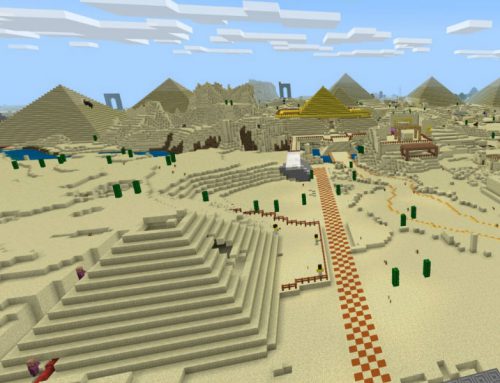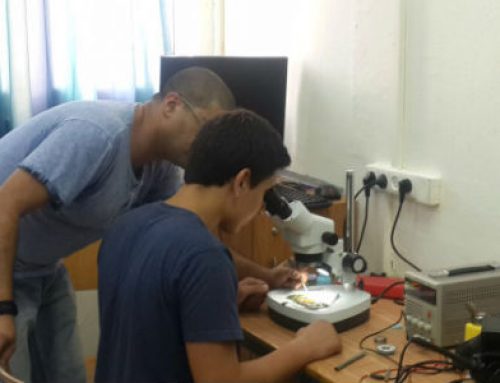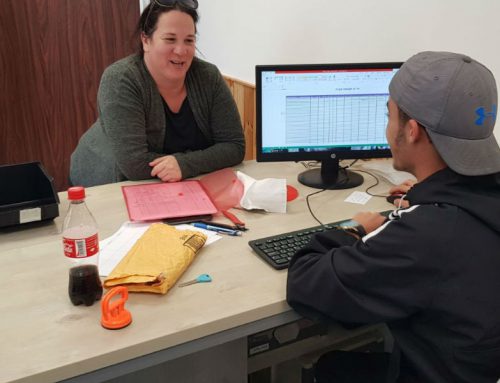What is Technological-Vocational Education?
From the Ministry of Education website: The technological and vocational education is a study program that starts in 10th grade and continues to 12th grade. The technological education is studied at around 860 schools nationwide, from Dan to Eilat. Around 140,000 students participate in it, which are 38% of all high school students.
Technological education currently offers 25 diverse and varied fields of study, which cover many areas of interest: software engineering, robotics and mechanics, electronics, various design professions, biotechnology, business management professions, automotive, cooking and baking, electrics, construction and architecture, communications and media, fashion design, beauty care and more.
Technological education students may delay their military service, continue to 13th grade, and receive a technician’s diploma. When they continue to the 14th grade they receive a practical engineer’s diploma (In many schools it is already possible to receive a technician’s diploma at the end of the 12th grade).
What Does Technological-Vocational Education Give?
The study programs in technological education are an attractive starting point for academic engineering paths, for the labor market and for Israel’s industrial needs. The programs are updated in terms of learning content and strengthened according to industrial and academic needs.
Technological and vocational education students may receive a relevant profession certificate alongside their matriculation certificate, thus opening up more opportunities for their military service and for integration into the labor market in the future.
Technological and vocational education students can continue to technicians and practical engineering studies.
Technological and vocational education students may receive both a matriculation certificate and a profession certificate.
The professional studies expand the range of the student’s possible placements in the IDF thus making it possible to serve a significant service.
In addition, the experience that the students acquire during their studies opens opportunities for continuing studies and for the labor market.
Technological vocational education students learn a scientific subject as a base for technological education, part of them in extended studies. In this way, it is possible to pursue a full matriculation study path with innovative and relevant specializations.
From a Research Summary Conducted by the Science and Technology Administration, led by Doctor Offer Rimon
97% of the students attribute great importance to completing studies with a matriculation certificate.
90% of students want to receive professional experience in high school that will assist them to acquire a profession in the future.
95% of parents attribute great importance to completing studies with a matriculation certificate.
75% of parents would like their children to receive professional experience that will assist them to acquire a profession in the future.
In contrast with the above, “Ha’oketz” website publishes the Bank of Israel’s research results which teach that vocational education graduates’ achievements were much lower than those of similar theoretical education graduates: vocational education graduates acquired less tertiary education, lower professional prestige, and according to some of the results, their monthly and hourly pay was lower.
According to recent data from the “Adva” center, 43.8% of the Jewish students who are graduates of the theoretical path get to university compared to 30.3% of technological education students.
Among the Jewish population, the Mizrahi population in the geographical and social peripheries was the main population for which the vocational schools were designated; therefore, there is a basis for the protest of three Mizrahi ministers in the south- Meir Cohen, Amir Peretz and Silvan Shalom- against the expansion of the vocational education.
The Harari committee, which examined the technological- vocational education at the time, concluded that a big part of it is was unnecessary. The conclusion was to cancel the professional training component and to expand the scientific and theoretical education. One of the committee’s main explanations was that technology changes rapidly and therefor there is no point in specific professional training. Other experts suggest transferring the professional training to a post-secondary education stage, in which people can receive relevant professional training in a short time.
Dr. Shlomo Svirsky and Adv. Noga Dagan Bouzaglo from the “Adva” center, suggest cancelling the separation between theoretical and vocational high schools as well as any other separation in the education system. They propose that all high schools in Israel teach a unified core curriculum, alongside which students will be offered technological programs from which they will be able to choose. The condition is that the diverse curriculum will be unified in all schools.
The Reasons Why it is Difficult to Perceive Vocational Education as Prestigious
- Choosing a “life career” at an age too young- not all parent or students know at age 13 what is right for them and what profession suits them as a main study path.
- Because an absolute majority of Mizrahi boys study in vocational schools, there is a perception that there is an ethnic and gender problem.
- Tracking according to what the school has to offer and not according to what is best for the student.
- Irrelevant teaching content- the teachers completed their training many years prior to teaching and they teach students who continue to military service or to the labor market after a long period of time. Usually the content is obsolete and irrelevant.
- Confusion in the definition of content: industry, factories, army, free market- everyone tries to dictate the content and through them the graduate figure instead of it being done by the education system in cooperation with real customers, that is, the parents and students.
- Relatively low salaries and difficulty teaching in big classrooms exclude the most up-to-date experts from teaching through the education system. Some of them contribute to the system as freelancers (in addition to their work in Israeli high-tech companies)
- Expensive equipment that does not reach the schools
- In terms of social perception, the prevailing image is that vocational education is inferior to that of theoretical education.
- The vocational education is presented to the public as a default choice for those who cannot reach academic education or a matriculation certificate. This approach is problematic because it labels the students as second class with a glass ceiling, which reduces their chances of reaching higher education.
- Different bodies treat the students as a recourse for exploiting their needs. The education system does not provide resources in a differential manner in order to create equal opportunities and free choice.
- Matriculation exam results are still the essence of everything. School, local authorities and the public are accustomed to evaluating an education system according to the percentage of those entitled to a matriculation certificate and there is no room left for any other definition of success.
So what is New in Technological Education Despite the Above?
In recent years, there is an alternative direction for the long and expensive professional training programs. The new direction is made up of short-term specializations, targeted at receiving certification and a professional certificate, recognized by international companies such as Cisco and Microsoft, SolidWorks, Priority and others.
A wide range of courses that train for highly regarded work with a high and prestigious reputation is offered.
Courses in media, design and WEB, product design and 3D printing course, courses in cellular, 3D, development and application fields.
Particularly noteworthy is the specialization that was successfully developed through work with at-risk youth, in the peripheries and in disadvantaged neighborhoods, and for special needs students.
Greater cooperation with the industry, the IDF and the free market in which the orientation is different and is more directed toward the student, his desires and aspirations.
Flexibility and social mobility as a result of training that is relevant for the current market.
The companies that train for certifications enable access to up-to-date and modern equipment.
Fostering interest, awareness and scientific excellence in the high-tech industries with the assistance of the most advanced technologies.
Coordination of employment horizons with all relevant bodies in the Israeli economy.
In this way, the learning becomes effective and empowering.





